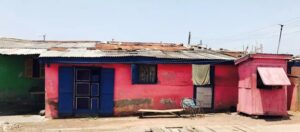
Housing is a basic right of everyone. It provides a basis of stability and security for an individual or family. Securing a place to live can give you peace, security and dignity. As a country, Ghana has been working to bridge the supply of housing and shelter. It is estimated that about six (6) million out of the 33 million Ghanaians need housing. There is a need to reflect on the bottleneck of the housing deficit and how Ghana has to work and build about 1.8 million housing units. This will help make our cities and human settlements inclusive, safe, resilient and sustainable (SDG Goal 11).
Accra is known to be the land of opportunities in Ghana. Many people move to the capital city of the country for education, job opportunities, and even entertainment. The city is also blessed with enormous social amenities, such as good roads, schools, and a sustainable energy supply. Due to the concentration of the population in the city, the government continues to invest in expanding the facilities to meet the demand. The sudden increase in migration to Accra has resulted in overbearing socio-economic issues like unemployment, poor health infrastructure, environmental pollution and housing deficit, among others.
Cost of housing in Ghana
It is extremely expensive to rent or buy a house in Accra. In October 2021, Numbeo reported that Accra was ranked as the second most expensive city in Africa while also having the highest prices for new property acquisitions. It ranks ahead of Nigeria’s Lagos, South Africa’s Johannesburg, and Egypt’s Cairo. The high cost of housing is further exacerbated due to the high interest by foreign businesses and tourism travellers.
Business Insider Africa reported in 2022 that Ghana has a property price-to-income ratio of 87.65 percent and an affordability index of 0.04 percent. A one-bedroom apartment in Accra’s city centre could cost as much as US$884.46 per month. The average monthly net salary after tax is US$344.84. With this, middle-income workers are unable to purchase or rent decent accommodation, and many people have resorted to living in kiosks and other unapproved settlement options.
Rental accommodation has been a significant share of shelter services in the country, especially in urban areas, catering for 34.6 percent of households – out of which 46 percent are in urban areas and 17.1 percent in rural areas. The rent laws sanction monthly payments of rent. However, landowners are also taking advantage of the demand to charge a minimum of 2 years’ advance payments to confirm rent for an apartment. Housing units or land for sale are mostly charged in foreign currencies, further deepening the plight of patrons. In a recent radio interview, landlords justify the high prices and advance payments on the high cost of building materials on the market.
Solving the housing deficit – initiatives by the state & private sector
In bridging the housing gap, government institutions have been actively building structures for rent and purchases.
Research reveals that only 5 percent of Ghana’s population can acquire their own homes without any form of assistance, with 60 percent requiring support that is facilitated by the state to access housing while 35 percent will require additional direct support before they can have access to housing.
The government has initiated the National Rental Assistance Scheme (NRAS), intended to support deserving households to access decent rental accommodation and to effectively protect them from exploitation and burdensome rent advance payments. The scheme, with an initial GH¢30million investment, is expected to provide low-to-middle income earners with a mechanism to pay low monthly rent, which effectively removes the need for rent advance payment and ultimately improves the quality of rental accommodation, especially in urban cities.
State Housing Company provides homes and estate management services to government agencies, local authorities, developers, and private home buyers through a commercial approach; and offers competitive property offers and practical maintenance and support grounded in years of experience.
The opportunities in the housing sector have attracted private businesses to invest in developing homes for rent and for sale. There are also banking products that have been introduced to provide pre-financing and flexible repayment options for homeowners.
As students, universities are also expanding accommodation infrastructure to meet the demand. For example, in July 2023, the University of Ghana commenced the Ghana Universities Staff Superannuation Scheme (GUSSS) Students Hostel Project. When completed, the entire project will serve a total of four thousand, one hundred and sixty (4,160) students.
>>>the writer is a student journalist at the University of Media, Arts, and Communications (UNIMAC-GIJ). Reach out to her on [email protected]










